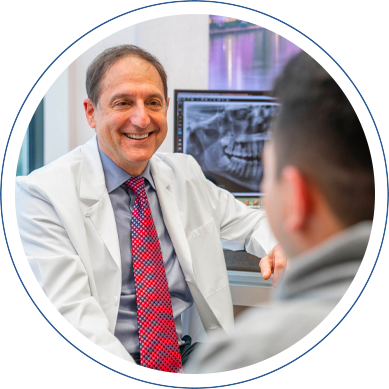Halitosis Treatment
Most people experience bad breath—also known as halitosis—at one time or another. In most cases, this is considered normal. For example, unpleasant “morning breath” is caused by reduced levels of saliva in your mouth at night (saliva helps wash away food and bacteria in the mouth, keeping the breath fresh). However, persistent bad breath can signal an oral health issue or general health problem that needs to be addressed.
Do I have bad breath?
How do you find out if you have halitosis? People are generally not able to detect when their breath is unpleasant because the nose adapts to a person’s smell. Your dentist can help you, however, as they are trained to identify and treat the many different causes of bad breath.
Common causes of halitosis:
Poor dental hygiene: In most cases, bad breath originates in the oral cavity. Even a healthy mouth contains millions of bacteria. The moist, warm conditions in the mouth are an ideal environment for bacteria to thrive. Without regular and thorough brushing and flossing, food particles will remain in the mouth, creating an unpleasant odor.
Periodontal (gum) disease: Plaque, an invisible film of bacteria, regularly forms in the mouth. As plaque builds up, it can create toxins that irritate the gums, leading to an infection that can lead to tooth loss if left unchecked. Regular dental checkups can help ensure that periodontal disease is detected and treated early.
Dry mouth: Saliva helps neutralize bacteria and wash away food particles. Therefore, conditions that cause dry mouth (including diabetes, Sjogren’s syndrome, and conditions that require radiation therapy) or certain medications (including drugs for allergies, depression, and high blood pressure) can lead to bad breath. If dry mouth is identified as the cause of your halitosis, you can help keep your mouth moist by increasing your fluid intake. Your dentist may also prescribe artificial saliva or a special rinse.
Medical conditions: Halitosis can indicate an infection of the throat, lungs, or sinus cavity. In rare cases, halitosis may indicate an underlying systemic illness such as diabetes, liver disease, lung disease, kidney disease, or acid reflux. Your dentist can help identify the source of your halitosis and refer you for additional tests or treatment if necessary.
Foods, beverages, cigarettes, and chewing tobacco: Foods like garlic and onions are absorbed into the bloodstream and eventually expelled from the lungs. Cigarettes and tobacco leave a residual mouth odor. Mints and mouthwash can help, but are only a temporary fix.
To determine the source of your bad breath, your dentist will give you a thorough oral examination and review your oral health habits, diet, medical history, and history of your symptoms. Then, you will be provided with a treatment plan that will help you be confident that your breath is fresh and pleasant to others.
If you have any questions about halitosis, or wish to schedule an oral health consultation, please contact us at our Washington, DC dental office.



